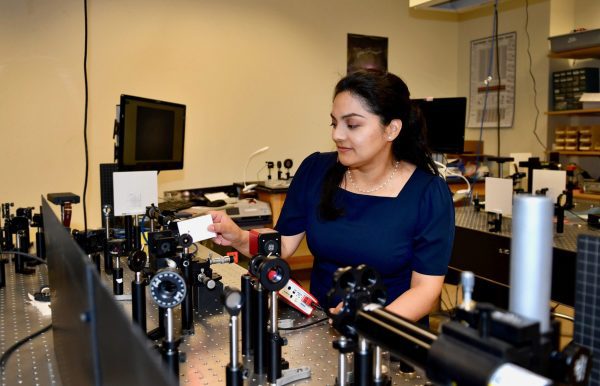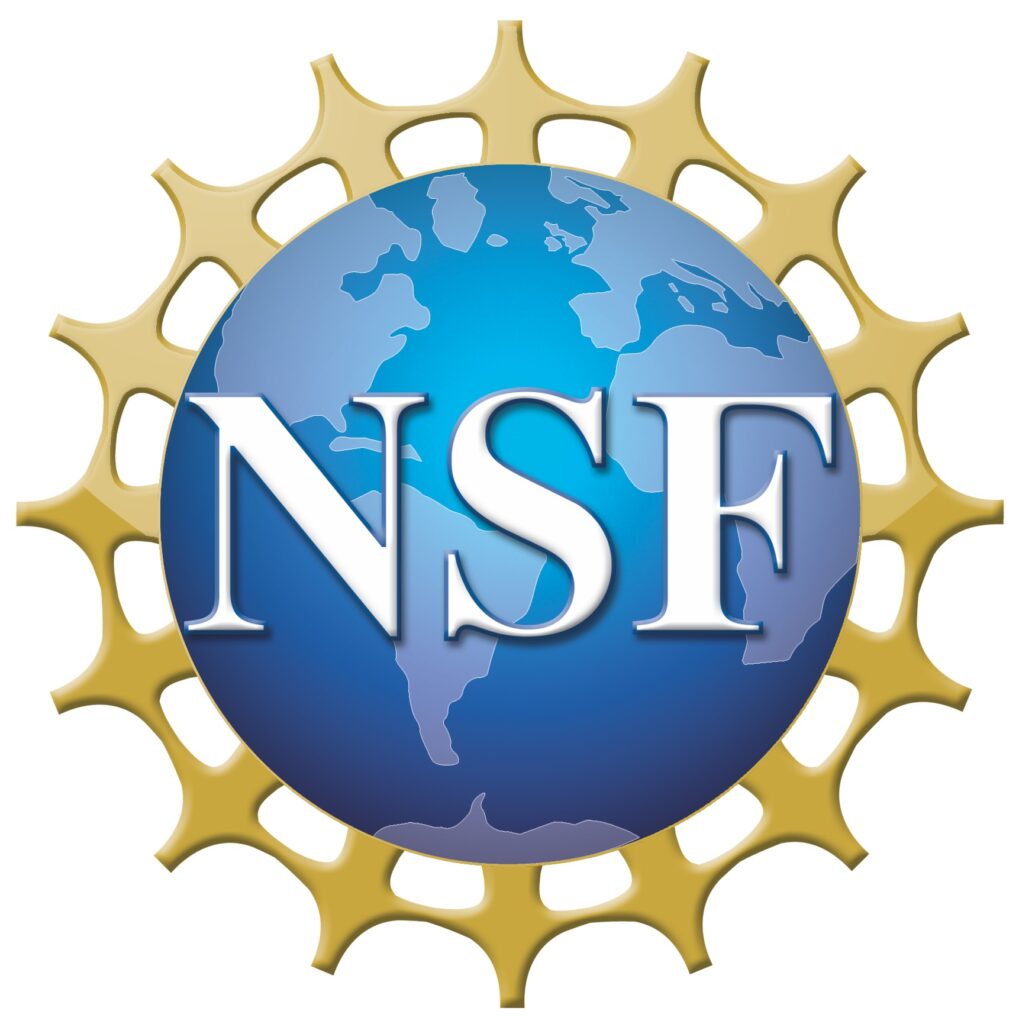Researcher Earns NSF CAREER Award To Support Work With Optical Systems To Find Creative Solutions

UNC Charlotte researcher Rosario Porras-Aguilar is fascinated by light, inspired by its beauty and its usefulness. Specifically, she focuses her pioneering research on how light can enable more accurate quantitative data in fields ranging from microbiology to high-tech manufacturing.
To support her research, Porras-Aguilar this spring received a coveted National Science Foundation Faculty Early Career Development Program (CAREER) Award. “By the end of this project, we will have developed theoretical models and experimental probes of a SMART imaging system,” Porras-Aguilar says. “SMART stands for Specific, Measurable, Accurate, Reconfigurable, and real-Time imaging systems.”

CAREER awards are the NSF’s most prestigious awards in support of early-career faculty who have the potential to serve as academic role models in research and education and to lead advances in the mission of their department or organization. Porras-Aguilar’s anticipated funding is $500,000 through 2026.
Also this spring, she received a 2021 Cottrell Scholar Award, one of 25 outstanding teacher-scholars in chemistry, physics, and astronomy chosen in the United States and Canada. Research Corporation for Science Advancement provides the $100,000 awards, which also offer opportunities for future funding and collaboration on projects with potential national impact.
Broadly speaking, Porras-Aguilar’s Active and Reconfigurable Optics Laboratory conducts research focused on developing microscopy techniques to obtain quantitative data in three dimensions with applications in microbiology and industry.
“My long-term goal is to enable smart imaging systems with reconfigurable capabilities to detect and measure objects that are hard to visualize,” she says. “Examples include transparent cells in biological samples or monitoring small temperature changes in tiny regions of materials for nuclear decay tests.”
Research Holds Important Implications For Medical Diagnoses
In microbiology applications, the research promises the enabling of quantitative observations to provide more accurate and earlier diagnoses of disease. Her research anticipates that automated, speedier and more accurate diagnoses will dramatically improve advances and outcomes in microbiology, personalized medicine, pathology, visual optics, brain imaging and other medical and biological fields.
“One critical challenge in microbiology and pathology is the need for quantitative methods to monitor biological samples,” she says. “Currently, we can use fluorescence microscopy to label and enhance specific areas of interest, but it is time-consuming, costly, and sometimes unreliable. Other cell parameters are currently estimated by the naked eye, leading to imprecise and slow studies.”
A new generation of reconfigurable imaging systems will permit sample analysis automation, she says.
Smart imaging and optical metrology can also impact ultra-precision manufacturing industries. “This research on optical materials is expected to contribute to the development of imaging technology that will significantly impact manufacturing industries, such as the freeform optics industry and additive manufacturing technologies, which will, in turn, promote the economic growth of the United States,” she says.
The applications also can impact national security, and productivity, such as through more effective ways to harness “big data” using artificial intelligence and machine learning algorithms. Porras-Aguilar is co-principal investigator for several research projects with the Center for Freeform Optics and the Center for Precision Metrology.
Porras-Aguilar’s fascination with light began years ago, by looking at the stars at night. “Professionally, my interest in optics began during my master’s in astronomy studies when I learned about telescopes that can compensate for the deformation in images induced by changes in the atmosphere,” she says.
She completed her doctoral studies in optics science at the National Institute in Astrophysics, Optics, and Economics. “I found myself learning about intriguing liquid crystal materials,” she says. “With these materials, it is possible to control light and open doors to applications, including microscopy.”
“I found that astronomical images in the macro-universe are just as mesmerizing as the ones we can find in the micro-universe.”
— Rosario Porras-Aguilar
Seeking a CAREER Award appealed to Porras-Aguilar not only because of its potential to fund her research; she also was drawn by its emphasis on educating future generations.
“I have always been passionate about research and education,” she says. “Since the first time I learned about this award, I saw it as an opportunity to consolidate my career and open doors to younger generations of scientists.”
Porras-Aguilar feels the sense of trust that comes along with being selected for a CAREER award. “I highly appreciate the vote of confidence given to me by the National Science Foundation, UNC Charlotte, and the Department of Physics and Optical Science,” she says. “It is not only motivating but also a commitment to excellence and integrity.”
Cross-Disciplinary Collaboration Helps Advance Research
She specifically credits mentors in her department with helping her advance her research, including department Chair Glenn Boreman, and more recently, longtime researcher Michael Fiddy, as well as UNC Charlotte Research and Economic Development’s Catalyst bootcamp and collaborators across the University.
“Collaboration is crucial in my research because it is cross-disciplinary,” she says. “One part of my research has applications in the metrology of samples for the manufacturing industry and free-form optics. I collaborate with Dr. Konstantinos Falaggis from the Mechanical Engineering and Engineering Science Department on this subject. I also collaborate with Dr. Juan Vivero-Escoto from the Chemistry Department to use the imaging techniques that I develop to study biological samples.”
She also commends students for their involvement and their influence. “Students are key to our scientific productivity because teamwork is essential to achieve our goals,” she says. “It is gratifying as a mentor to see students mature and contribute with new ideas and findings.
Porras-Aguilar has long embraced diversity and inclusion efforts, committing time and leadership with SPIE, its Women In Optics initiative and other efforts. Convinced that outreach activities can convey a message with gender equality, she was the official advisor of the SPIE Women in Optics Chapter at INAOE in Puebla, Mexico and continued to advise the student chapter until August 2018, despite her relocation to UNC Charlotte in 2017.

“Diversity and excellence are crucial to advance any field, and particularly science,” she says. “If science is benefited, humanity is benefited as well. Unfortunately, many populations are underrepresented in STEM areas. These underrepresented groups are the ones that face social and/or economic disadvantages.”
Her CAREER project includes an educational component centered on students and diversity. The work will include hands-on research and mentoring experiences in physics and photonics for high-school students and teaching strategies to foster the curiosity and talent of undergraduates, especially those from groups traditionally underrepresented, including Hispanics and women.
Porras-Aguilar plans to collaborate with the Center for STEM Education at UNC Charlotte, the LatinX/Hispanic Faculty Staff Caucus at UNC Charlotte, and the Physics Undergraduate Mentoring Program (PUMP) from the Department of Physics and Optical Science.
“Visibility and mentoring are the two proven solutions that have been reported in various studies to break the stereotype of a scientist in STEM areas,” she says. This commitment is key to her research and to her passion for sharing the light.
Words: Lynn Roberson, CLAS Communications Director | Top Image: Kat Lawrence, University Photographer | Other Image Courtesy of Rosario Porras-Aguilar